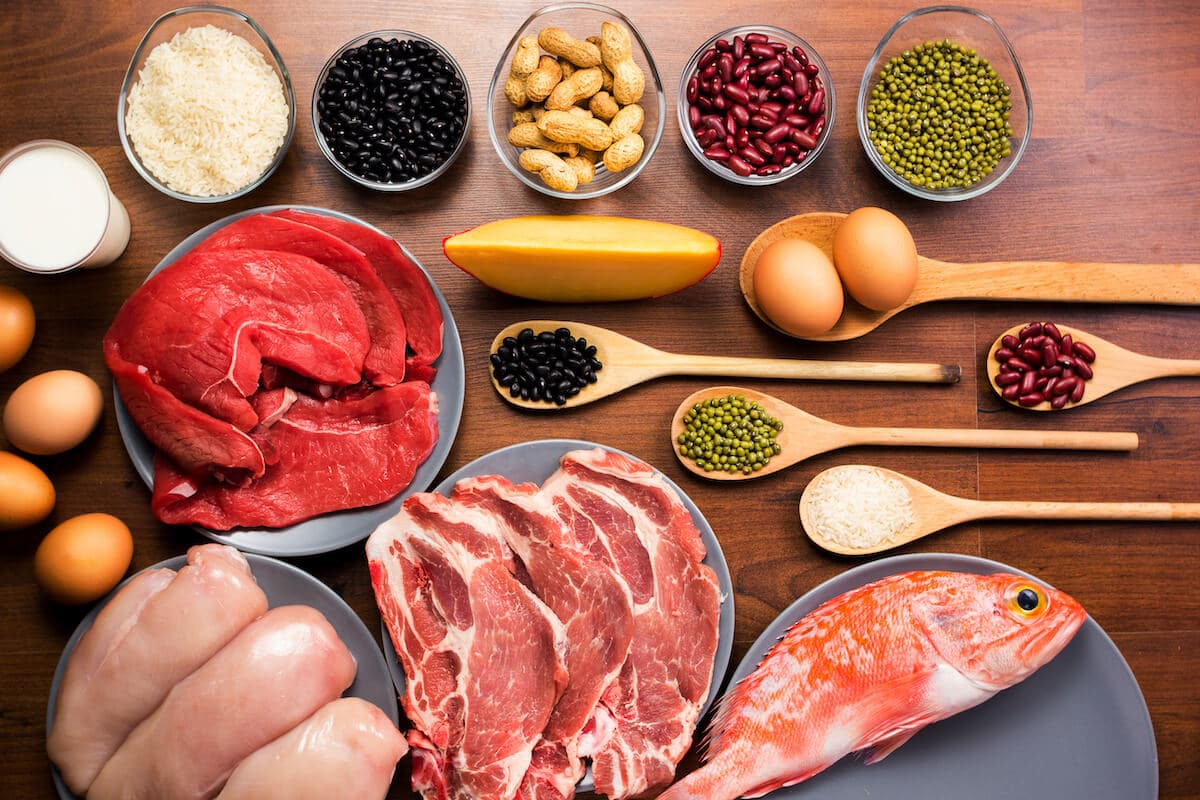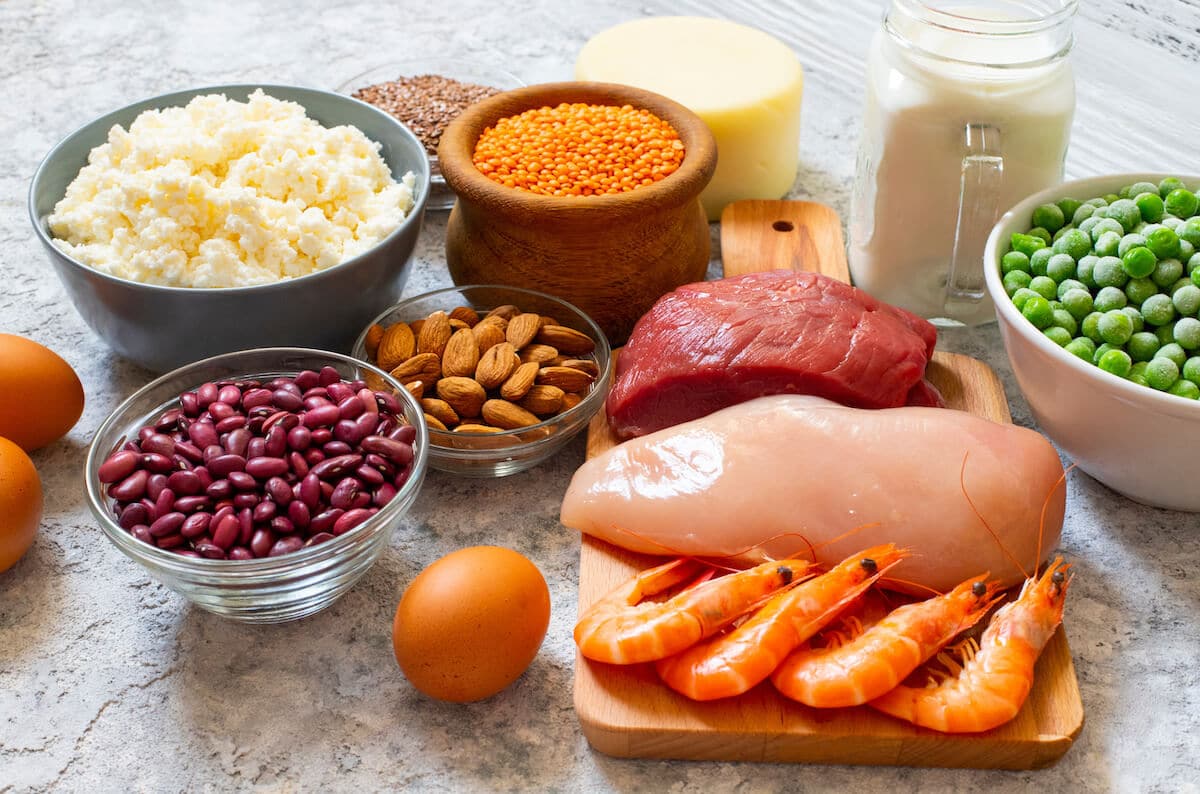
21 Jun Different Types of Protein: Complete vs. Incomplete
Protein is an essential nutrient your body uses around the clock. It helps build and repair muscles, tissues, bones, and organs, and it helps the neurons in your brain communicate with each other. It’s also a must-have if you’re trying to build muscle or increase strength.
It’s important to understand two different types of protein — namely, complete and incomplete — to use this nutrient effectively in your diet. Protein is made of building blocks known as amino acids, and when it contains all nine of the essential amino acids that your body can’t make on its own, it’s known as a complete protein.
In this guide, we’ll examine the different types of protein, the best sources of protein, and tips to help you meet your daily protein requirements.
Understanding Protein
The three macronutrients your body needs to survive include carbohydrates (carbs), fats, and proteins. Protein is in every cell in your body and is required to support critical functions. For example, it helps your immune system, brain function, eyesight, and pH balance — it also provides what’s needed to produce enzymes, antibodies, and hemoglobin.
Protein is also essential for muscle growth and repair, and when you exercise more, you have higher protein requirements. As such, protein intake is a popular topic of discussion among bodybuilders and athletes.
Each gram of protein contains four calories, and the amount required daily varies according to your activity level, age, height, weight, and health. On average, though, most people need 0.8 grams of protein per kilogram of body weight each day. And if you exercise regularly, you may need 1.2 to 2 grams of protein per kilogram of body weight each day.
Amino Acids
Protein is made up of building blocks known as amino acids. When you consume protein, your body breaks it back down into amino acids, which it can then use and recombine as needed. All amino acids are necessary for health and well-being, but your body cannot make nine of them. These are known as essential amino acids, and they include:
- Methionine
- Valine
- Lysine
- Leucine
- Isoleucine
- Threonine
- Histidine
- Tryptophan
- Phenylalanine
To obtain these essential amino acids, you must consume food sources that contain them as part of their protein content. Three of the essential amino acids are known as branched-chain amino acids or BCAAs, which help to prevent muscle loss, boost your energy levels, improve performance, and speed up recovery after exercise. They can help you meet your fitness goals and are typically taken as a supplement before a workout.
Non-essential amino acids include:
- Alanine
- Arginine
- Asparagine
- Aspartic acid
- Cysteine
- Glutamic acid
- Glutamine
- Glycine
- Proline
- Serine
- Tyrosine
These non-essential amino acids are essential for your health, and your body can make them by recombining other amino acids.
Different Types of Protein

If you’re eating enough protein but not consuming complete proteins, your body won’t get everything it needs to function. Here’s a quick comparison of complete versus incomplete protein.
Complete Protein
Complete proteins contain significant amounts of all nine essential amino acids. They’re most commonly found in animal products, but some plant proteins also contain complete protein.
Common sources of complete protein include:
- Dairy products like milk and cheese
- Eggs and egg whites
- Meat like beef, chicken, and pork
- Fish
- Beans and legumes like green peas and soybeans (including soy products such as tofu)
- Grains and seeds like quinoa, hemp, chia seeds, buckwheat, and sunflower seeds
You can also combine incomplete plant proteins to make a complete protein in your meal. For example, rice and beans are incomplete proteins separately, but they make a complete protein when combined. The same is true with barley and lentils.
Different Types of Protein in Supplements
Beyond complete protein and incomplete protein, or even plant protein and animal protein, different types of animal-based protein foods contain different kinds of proteins. You can find these in supplements to better target and include different types of protein in your diet.
The most common types you’ll see include:
- Whey protein: Found in dairy products, whey protein is a byproduct of cheesemaking. It’s commonly available as a protein powder and contains high amounts of calcium and leucine. Whey protein is one of the most effective options for stimulating muscle protein synthesis due to its high leucine content (muscle protein synthesis refers to the natural process of repairing and growing muscle mass).
- Casein protein: This slow-digesting animal protein is found in dairy products. Because it digests slowly, it releases amino acids slowly too. It’s common to take casein supplements at night to provide your body with a prolonged release of amino acids to support muscle recovery. Casein is commonly available as a protein powder, and like whey protein, it contains high levels of leucine and calcium. It’s also popular for weight loss, as slow digestion can help satiety after a meal.
- Whole food protein sources: Since whey and casein are derived from dairy sources, they’re not suitable for those following a plant-based diet. They can also cause issues for those who are lactose intolerant, especially if you’re not using isolates (like whey protein isolate), which have a lower lactose content. In either case, you might opt for options like soy protein, egg white protein, or pea protein supplements.
There are other protein supplements (e.g., collagen and BCAA supplements), but not all of them contain complete proteins. Above all else, using high-quality protein supplements with an emphasis on bioavailability is a must — bioavailability refers to your body’s ability to absorb the nutrient. Low bioavailability can result in lost protein that your body couldn’t absorb.
Incomplete Protein
Incomplete proteins lack in one or more essential amino acids. You can check which amino acids a food contains by searching it in the USDA Nutrient Database and examining the amounts of each one per serving. Generally, any food with less than 0.1 grams of a specific essential amino acid per serving is considered incomplete.
However, as we previously noted, you can combine incomplete proteins to make complete proteins. For example, grains paired with beans or legumes are a common way to make a complete protein in a meal. While there’s nothing wrong with eating different types of protein, including incomplete proteins from plant sources, you’ll need sources of complete proteins for a healthy diet.
Protein Intake Tips

Depending on activity level and muscle growth goals, some struggle to meet their daily protein requirements — this is especially true if you’re following a high-protein diet. Here are tips to help you meet your daily protein requirements:
- Try protein supplements: Protein supplements provide your body with complete proteins and give you access to different types (e.g., whey protein and casein protein). Protein shakes and bars are an excellent way to supplement your dietary protein intake and add more high-quality protein to your diet. We recommend Ingredient Optimized supplements with high bioavailability.
- Divide protein evenly between meals: Divide the grams of protein you need each day by the number of meals and snacks you consume. Aim to eat approximately this amount of protein in each meal to make it easier to hit your goals. You might include a protein supplement with one or more daily meals to hit your goals.
- Use caution on vegan and vegetarian diets: Animal proteins are the primary source of protein in most diets, but it’s possible to get enough protein on a plant-based diet. Track your protein intake, ensure you’re eating plenty of protein foods that contain complete proteins, and consider consulting with a nutrition expert for personalized guidance. Supplements are often the easiest way to hit your goals.
Support Your Body With Quality Protein

Understanding the different types of protein will help you support your body and reach your muscle gain goals. Supplements are the easiest way to fill any gaps in your dietary protein intake, giving you the option to add measured amounts of this essential nutrient to any (or every) meal. To get started, consider the following supplements:
- The ioPEA from MyProtein
- ioWhey Protein from Performix
- Plantein from Kaged Muscle
- Clean Meal from Kaged Muscle
Remember: Using high-quality supplements is the best way to ensure your body gets the amount of protein listed on the label. Low-quality supplements can be difficult for your body to absorb, allowing some (or most) of the protein to pass through your system.


